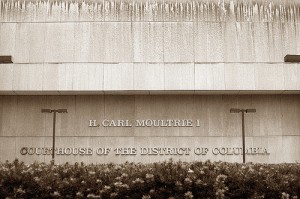Going Back to Moultrie
It’s been nearly six months since the verdict came down in the criminal case. Judge Lynn Leibovitz’ summertime dose of cold comfort has given way to an unseasonable blast of frigid weather here in America’s Hockey Capital.
 Today marks our second trip to Judiciary Square since the June 29 ruling; the last was for the September 16 status hearing. Just fifteen minutes long and over in the blink of an eye; yet months later it still reverberates.
Today marks our second trip to Judiciary Square since the June 29 ruling; the last was for the September 16 status hearing. Just fifteen minutes long and over in the blink of an eye; yet months later it still reverberates.
On the agenda for this morning’s 10am session: the motion to dismiss/summary judgment, a 5th Amendment puzzle that would perplex even the Founders and motions that pertain to Wone counsel Patrick Regan’s September courthouse hallway smacktalk – namely, the gag order.
A busy news day on what happens to be the second anniversary of the first post here. Rulings may come down today which will shape the proceedings in the out months and October trial, but other key questions loom, like who may end up actually presiding over this case.
That and more, after the jump.
None of the defendants were present at the September 2009 status in the civil case, nor this September’s. Perhaps today will be different. Rather than the mundane matters considered in September, far weightier business is at stake today and that may dictate whether defendant Joe Price, who is thought to have a hand in the legal strategy, surfaces. In effect, the whole case is on the line with the defendants’ motion to dismiss and/or for summary judgment. That’s the whole ball of wax.
Dylan Ward, whose early November mute deposition spurred this hearing, also has some skin in the game today with the plaintiff’s motion to compel testimony. However, his attendance appears unlikely. That motion too, may interest Price since his deposition – and that of domestic partner Victor Zaborsky – will probably occur in a matter of weeks.
We had thought that defendant hearing attendance, while not required, is considered good form – proper manners for the court set. But we were reminded of one of those key distinctions between criminal and civil proceedings: no significant element of a criminal case can be conducted without the defendant(s) present.
But one of the biggest questions regarding attendance is whether we’re to see musical chairs at the bench, much as we did in the criminal trial.
The annual Superior Court judge calendar swap that begat Leibovitz, may bring a new set of robes.
And if that doesn’t do it, there’s always the matter of Judge Brook Hedge’s September announcement that she was seeking senior status, which may mean retirement.
Just this week, Legal Times’ Mike Scarcella has news that a replacement has just been nominated to take her gavel:
Commission Nominates Nine Lawyers for D.C. Superior Court Vacancies
The White House today received the names of nine lawyers who are finalists for three vacancies on the District of Columbia Superior Court. The D.C. Judicial Nomination Commission, which announced the nominees, said President Obama has 60 days to select an attorney to fill each vacancy. The retiring judges are Kaye Christian, Brook Hedge and Judith Retchin.
For Hedge’s spot, the JNC nominated Catharine Easterly, an attorney in the special litigation division of the D.C. Public Defender Service; Assistant U.S. Attorney Teresa Howie, deputy chief of the Superior Court division; and Steven Wellner, an administrative law judge and former Kirkland & Ellis partner.
A very busy agenda on a cold winter’s day. Updates here during the day and maybe on the twitter, just like during the summer. And soon it will be spring.
Lastly: Our thanks to Roby Chavez and WTTG-TV, Fox5, a co-signer on the motion to intervene, for his piece setting up today’s hearing.


I’ll post this again when the update goes up, but here’s a general question for people. Which scenario looks worse to you:
(a) Someone who invokes their Fifth Amendment rights on their own when asked if they brutally stabbed a person to death.
(b) Someone who invokes their fifth Amendment rights ON THE ADVICE OF THEIR LAWYER when asked if they brutally stabbed a person to death.
Frankly, I think (b) looks a lot worse.
So this quote confuses me “And to clarify, Judge Hedge ruled outright that counsel could take the 5th on behalf of the defendant.”
That says the counsel could do it for the defendants so why in the sentence before does it say the must do it in their own words.
I agree (b) looks far worse
DavidR:
In your first paragraph, what is “this quote” from?
The quote comes from todays update and judges order.
“On the plaintiff’s Motion to Compel: agreement has been worked out, and deponents will have to invoke the Fifth with their own words – particularly that they have accepted the advice of counsel and will invoke. And to clarify, Judge Hedge ruled outright that counsel could take the 5th on behalf of the defendant.”
Ooops no matter it was a typo
Reposted from below. Here’s a general question for people. Which scenario looks worse to you:
(a) Someone who invokes their Fifth Amendment rights on their own when asked if they brutally stabbed a person to death.
(b) Someone who invokes their fifth Amendment rights ON THE ADVICE OF THEIR LAWYER when asked if they brutally stabbed a person to death.
Frankly, I think (b) looks a lot worse.
the judge rocked on these rulings —